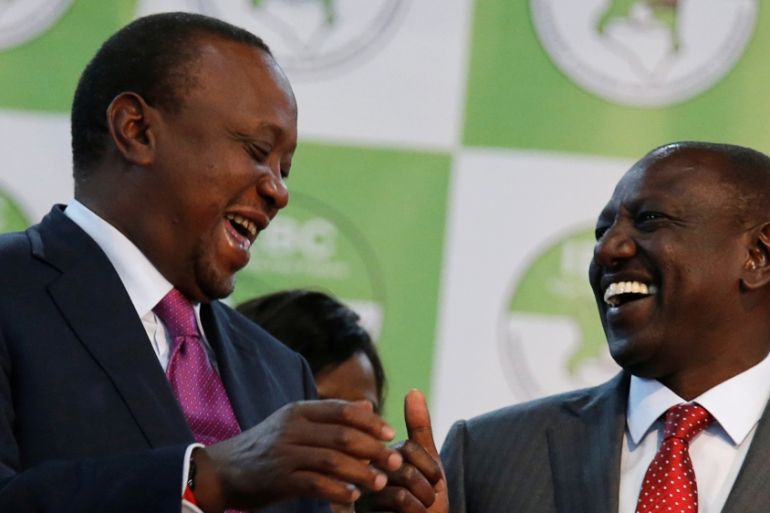Dynasties vs hustlers in Kenya
A new populist political narrative can help Kenya do away from ethno-politics.

Kenya’s Deputy President William Ruto is worried. At the beginning of 2018, he believed he was on his way to succeed President Uhuru Kenyatta, who is now serving his second and final term as president. His boss had publicly promised to honour his part of the deal the two had crafted just five years prior and would support Ruto’s bid to succeed him in elections scheduled for 2022.
However, another deal cut in March of the same year considerably muddied the waters. Raila Odinga, a former prime minister who had unsuccessfully challenged Kenyatta in the last two elections, and then had himself sworn in as the people’s president, was invited to Kenyatta’s office where the two emerged, shaking hands and vowing to work together and to let bygones be bygones.
“The handshake” with Ruto’s presumed rival for the presidency in 2022 has sparked fears from his side of the ruling Jubilee party that Kenyatta would renege on his promise. It has precipitated open revolt, with his supporters all but accusing the president of betrayal.
Ruto has sought to frame his feuding with Kenyatta as a contest between “hustlers” and “dynasties” – between struggling Kenyans of low birth and the alliance of wealthy families that has monopolised political competition in Kenya for two generations.
It is a pointed reference to Kenyatta’s and Odinga’s privileged upbringing as sons of the country’s first president and vice president respectively. By contrast, Ruto describes himself as “the gentleman who did not have shoes [who] is sitting at the high table with the son of the founding father”.
It is a somewhat misleading characterisation. Though true that Odinga was born into privilege, he was undeniably instrumental in the fight for democracy from his youth, suffering years of detention, torture and exile at the hands of the authoritarian and kleptocratic second president, Daniel Arap Moi, the very man who plucked Ruto from obscurity and mentored him, alongside Uhuru Kenyatta, as part of a new generation of political leaders.
This seriously undermines Ruto’s claim to be the voice of the downtrodden “hustlers” against Odinga as representing the corrupt elite. In fact, in his political career, he has been linked to numerous corruption scandals and the source of his fabulous wealth to date is largely unexplained.
Still, what he is attempting is a historical coup – to turn the political pedigree of the Kenyattas and the Odingas into a liability. It is a rejection of the basis of Kenya’s post-independence governance arrangements where it was assumed that the better-educated and more sophisticated independence elites who inherited the colonial state in 1963, including the children of colonial-era collaborators, would necessarily govern better than the masses of “wanjikus” or common folk struggling for access to similar opportunities.
Other Kenyan politicians with non-political family backgrounds have sought to co-opt this narrative and to link it to a global surge in populism.
“The world is going the wanjiku way,” the populist Governor of Nairobi County, Mike Sonko, declared recently on the popular Sunday night show, Punchline. “Take the example of the Ukraine. The president of Ukraine currently is a comedian. They voted for a comedian because the wanjikus were fed up with the leadership of that particular country […] Go to Liberia. They elected a footballer to be their president. Madagascar for the second time have elected a DJ, Rajoelina, to be their president”.
However, like Ruto, the ostentatious Governor Sonko, who has been accused of drug trafficking by the US government and is currently under investigation for corruption, is a dubious hustler champion.
Veteran journalist, Linus Kaikai, has suggested that “hustlers vs dynasties” framing is an inherently divisive tactic that would focus politics on personal backgrounds rather than the ideas that politicians bring to the table, a view endorsed by President Kenyatta.
Yet, though sullied by the association with questionable politicians, the “hustlers vs dynasties” narrative is an opportunity that should not be so easily discarded, as it actually offers Kenya its best chance to break out of the straitjacket of cold-hearted ethnic mobilisation and associated communal violence that has been the bane of our politics for decades.
Historically, Kenya’s politicians have fought to control, rather than to undo the system of extraction and exploitation inherited at independence. Ethnic mobilisation has been a useful tool in keeping the people blind to their own interests and substituting them for those of the politicians.
Politics has thus been a route to wealth for a few at the expense of the many. In turn, wealth, however ill-gotten, has become the justification for political power, underpinned by an ethnicised colonial system built on extraction, corruption and patronage.
Electoral contests routinely feature politicians hyping up ethnic fears and animosities in a bid to consolidate a tribal vote, which they then use as a bargaining chip to negotiate alliances and attain more power. The ethnic kingpins then parade their own access to illicit means of accumulation as a trophy for the tribe to vicariously enjoy.
Freed from the selfish manipulations of politicians, “hustlers vs dynasties” can be a useful alternative to ethnic mobilisation as the basis for political competition. By problematising the accumulation by politicians of all sorts – dynastic and dubious hustlers – it could provide a framework for the real hustlers, the common people, to do away with the fake ethnic blinkersand to truly see their common enemies – a parasitic elite and more importantly, the colonial system that supports it.
Uprooting that system is the final task of decolonisation. Only when that is done can the real work of building a genuine democracy – one that is responsive to the aspirations and needs of the people rather than of their politicians – begin.
The views expressed in this article are the authors’ own and do not necessarily reflect Al Jazeera’s editorial stance.
